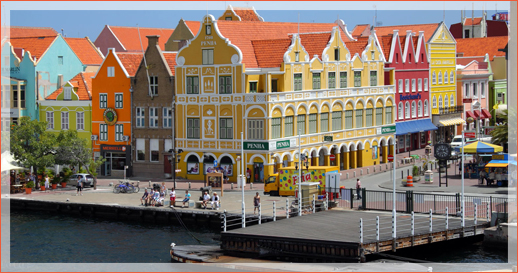Background:

Originally settled
by Arawak Indians, Curacao was seized by the Dutch in 1634 along with the neighboring
island of Bonaire. Once the center of the Caribbean slave trade, Curacao was hard
hit by the abolition of slavery in 1863. Its prosperity (and that of neighboring
Aruba) was restored in the early 20th century with the construction of the Isla
Refineria to service the newly discovered Venezuelan oil fields. In 1954, Curacao
and several other Dutch Caribbean possesions were reorganized as the Netherlands
Antilles, part of the Kingdom of the Netherlands. In referenda in 2005 and 2009,
the citizens of Curacao voted to become a self-governing country within the Kingdom
of the Netherlands. The change in status became effective in October of 2010 with
the dissolution of the Netherlands Antilles.
Dependency Status:
constituent country within the Kingdom of the Netherlands; full autonomy in internal
affairs granted in 2010; Dutch Government responsible for defense and foreign
affairs.
Government: Chief
of state: Queen BEATRIX of the Netherlands (since 30 April 1980); represented
by Governor General Frits GOEDGEDRAG (since 10 October 2010) head of government:
Prime Minister Gerrit SCHOTTE (since 10 October 2010) cabinet: Executive Council
elections: the monarch is hereditary; governor general appointed by the monarch;
following legislative elections, the leader of the majority party is usually elected
prime minister by the parliament
Dependency Status:
An autonomous country within the Kingdom of the Netherlands; full autonomy in
internal affairs granted in 1954; Dutch Government responsible for defense and
foreign affairs.
 Originally settled
by Arawak Indians, Curacao was seized by the Dutch in 1634 along with the neighboring
island of Bonaire. Once the center of the Caribbean slave trade, Curacao was hard
hit by the abolition of slavery in 1863. Its prosperity (and that of neighboring
Aruba) was restored in the early 20th century with the construction of the Isla
Refineria to service the newly discovered Venezuelan oil fields. In 1954, Curacao
and several other Dutch Caribbean possesions were reorganized as the Netherlands
Antilles, part of the Kingdom of the Netherlands. In referenda in 2005 and 2009,
the citizens of Curacao voted to become a self-governing country within the Kingdom
of the Netherlands. The change in status became effective in October of 2010 with
the dissolution of the Netherlands Antilles.
Originally settled
by Arawak Indians, Curacao was seized by the Dutch in 1634 along with the neighboring
island of Bonaire. Once the center of the Caribbean slave trade, Curacao was hard
hit by the abolition of slavery in 1863. Its prosperity (and that of neighboring
Aruba) was restored in the early 20th century with the construction of the Isla
Refineria to service the newly discovered Venezuelan oil fields. In 1954, Curacao
and several other Dutch Caribbean possesions were reorganized as the Netherlands
Antilles, part of the Kingdom of the Netherlands. In referenda in 2005 and 2009,
the citizens of Curacao voted to become a self-governing country within the Kingdom
of the Netherlands. The change in status became effective in October of 2010 with
the dissolution of the Netherlands Antilles.